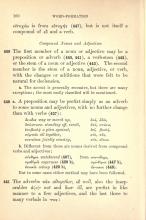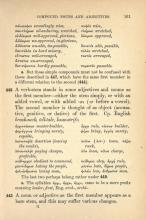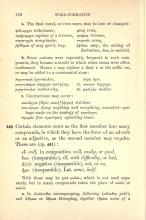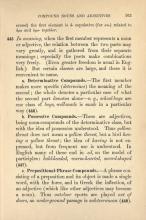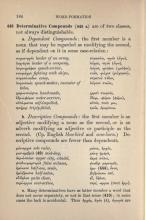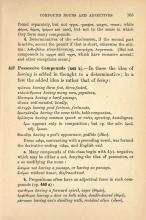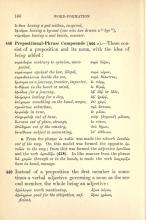439. The first member of a noun or adjective may be a preposition or adverb (§§ 440 and 441, below), a verb stem (§ 442, below), or the stem of a noun or adjective (§ 443, below). The second member is the stem of a noun, adjective, or verb, with the changes or additions that were felt to be natural for declension.
a. The accent is generally recessive, but there are many exceptions; the most easily classified will be mentioned.
440. a. A preposition may be prefixt simply as an adverb to some nouns and adjectives, with no further change than with verbs (§ 437).
| Compound | Members | |
| ἄν-οδος way or march up |
ἀνά | ὁδός |
| ἀπό-στασις standing off, revolt |
ἀπό | στάσις |
| ἐπι-βουλή a plan against |
ἐπί | βουλή |
| σύμ-πᾱς all together |
σύν | πᾶς |
| συν-αίτιος jointly causing |
σύν | αἴτιος |
b. Different from these are nouns derived from compound verbs and adjectives.
| σύνθημα watchword (§ 407) |
from | συν-τίθημι |
| προθῡμίᾱ eagerness (§ 429.b) |
πρό-θῡμος (§ 447.b) |
|
| ἀποικίᾱ colony (§ 429.b) |
ἄπ-οικος (§ 448) |
But in some cases either method may have been followed.
441. The adverbs πᾶν (altogether), εὖ (well), also the inseparables ἀ(ν)- (not) and δυσ- (ill), are prefixed in like manner to a few adjectives, and the last three to many verbals in -τος.
| Compound | Member |
| πάν-σοφος exceedingly wise |
σοφός wise |
| παν-τλήμων all-enduring, wretched |
τλήμων wretched |
| εὐ-δόκιμος well-approved, glorious |
δόκιμος approved |
| ἀ-δόκιμος un-approved, in-glorious |
|
| ἀ-δύνατος un-able, im-possible |
δυνατός able, possible |
| δυσ-τάλᾱς in hard misery |
τάλᾱς wretched |
| εὔ-τακτος well-arranged |
τακτός arranged |
| ἄ-τακτος un-arranged |
|
| δυσ-πόρευτος hardly passable |
πορευτός passable |
a. But these simple compounds must not be confused with those described in § 447 (below), which have the same first member in a different relation to the second (§ 444, below).
442. A verb stem stands in some adjectives and nouns as the first member— either the stem simply, or with an added vowel, or with added -σι (-σ before a vowel). The second member is thought of as object (accusative, genitive, or dative) of the first. [Cp. English break-neck, tell-tale, loose-strife.]
| Compound | Members | |
| ἀρχ-ι-τέκτων master-builder |
ἄρχω rule |
τέκτων builder |
| φερ-έγγυος bringing surety, capable |
φέρω bring |
ἐγγύη surety |
| λιπ-ο-ταξίᾱ desertion (leaving the ranks) |
λείπω (λιπ-) leave |
τάξις rank |
| λῡ-σι-τελής paying charges, profitable |
λῡ́ω loose |
τέλος charge |
| πείθ-αρχος obedient to command |
πείθομαι obey |
ἀρχή rule |
| μῑσ-ό-δημος hating the people |
μῑσέ-ω hate |
δῆμος people |
| φιλ-άνθρωπος loving man |
φιλέω love |
ἄνθρωπος man |
The last two perhaps belong rather under § 449 (below).
a. The syllables ἀρχ-, ἀρχε-, ἀρχι-, came to be a mere prefix meaning leader, first [English arch-, archi-].
443. A noun or adjective as the first member appears as a bare stem, and this may suffer various changes.
a. The final vowel, or even more, may be lost or changed.
| Compound | Member |
| φῡ́λ-αρχος tribe-leader |
φῡλή tribe |
| τριήρ-αρχος captain of a trireme |
τριήρης trireme |
| στρατ-ηγός army-leader |
στρατός army |
| ῥᾱ́ͅ-θῡμος of easy spirit, lazy |
ῥᾱ́ͅ-διος easy (the ending of derivation, -διος, is omitted) |
b. Since ο- stems were especially frequent in such compounds, they became a model to which other stems were often conformed. Hence ο may replace a final -ᾱ or the suffix -εσ,or may be added to a consonantal stem.
| Compound | Member |
| λυρ-ο-ποιός lyre-maker |
λύρᾱ lyre |
| σκευ-ο-φόρος baggage carrying |
[stem] σκευεσ- baggage |
| μητρ-ό-πολις mother-city |
[stem] μητ(ε)ρ- mother |
c. Contractions may occur.
| κακοῦργος evil-doer |
[epic] κακο[ϝ]έργος |
| παν-οῦργος doing anything and everything, scoundrel |
[perhaps made on the analogy of κακοῦργος] |
| τῑμωρός upholding honor |
for τῑμα-ϝορός |
444. The following elements enter as the first member into many compounds, in which they have the force of an adverb or an adjective, as the second member may require (cp. § 441, above).
εὖ (well), in composition well, easily, or good
δυς- (inseparable) ill, with difficulty, or bad
ἀ(ν)- (negative, inseparable), not, or no
ἡμι- (inseparable, Latin semi-) half
With these may be put καλλι-, which is not used separately, but in many compounds takes the place of καλός or καλῶς.
a. In ἀ-κόλουθος (accompanying, following; κέλευθος path), and ἅ-θροος or ἄθροος (thronging, together; θρόος noise of a crowd) the first element is ἀ- copulative (for σα-) related to ἅμα and ὁμο- (together).
445. In meaning, when the first member represents a noun or adjective, the relation between the two parts may vary greatly, and is gathered from their separate meanings; especially the poets make combinations very freely. (Even greater freedom is usual in English.) But certain classes are large, and these it is convenient to name.
a. Determinative Compounds— The first member makes more specific (determines) the meaning of the second; the whole denotes a particular case of what the second part denotes alone e. g., school-boys are one class of boys, well-made is made in a particular way (§ 446, below).
b. Possessive Compounds— These are adjectives, being noun-compounds of the determinative class, but with the idea of possession understood. Thus yellow-throat does not mean a yellow throat, but a bird having a yellow throat; the idea of having is not expressed, but from frequent use is understood. In English many of these end in -ed, on the model of participles: bald-headed, warm-hearted, sword-shaped (§ 447, below).
c. Prepositional-Phrase Compounds— A phrase consisting of a preposition and its object is made a single word, with the force, and in Greek the inflection, of an adjective (which like other adjectives may become a noun). Thus outdoor sports are played out of doors, an underground passage is subterranean (§ 448, below).
446. Determinative Compounds (§ 445.a, above) are of two classes, not always distinguishable.
a. Dependent Compounds: the first member is a noun that may be regarded as modifying the second, as if dependent on it in some case-relation.
| Compound | Members |
| στρατ-ηγός leader of an army |
στρατό-ς, -ηγός (ἄγω) |
| λοχ-ᾱγός leader of a company |
λόχος, -ᾱγός (ἄγω) |
| λογο-γράφος speech-writer |
λόγος, γράφος (γράφω) |
| ναυ-μάχος fighting with ships |
ναῦς, -μάχος (μάχομαι) |
| στρατό-πεδον camp |
στρατοῦ πέδον |
| λογο-ποιός speech-maker, inventor of tales |
λόγους ποιῶν |
| χειρ-ο-ποίητος handmade |
χερσὶ ποιητός |
| ὑδρ-ο-φόρος watercarrier |
ὕδωρ, -φόρος (φέρω) |
| αὐτό-ματος self-impelled |
αὐτός, [root μα-] |
| τριήρης triply-fitted |
τρεῖς, ἀραρίσκω |
b. Descriptive Compounds: the first member is an adjective modifying a noun as the second, or is an adverb modifying an adjective or participle as the second. (Cp. English bluebird and newborn.) Descriptive compounds are fewer than dependents.
| Compound | Members |
| μόν-αρχος sole ruler |
μόνος, ἀρχός |
| μεσ-ημβρίᾱ midday (49) |
μέση ἡμέρᾱ |
| ἀκρ-ό-πολις upper city, citadel |
ἄκρᾱ πόλις |
| ψευδ-ο-μαρτυρίᾱ false witness |
ψευδὴς μαρτυρίᾱ |
| ἡμί-ονος half-ass, mule |
ἡμι- (§ 444), ὄνος |
| ἡμί-βρωτος half-eaten |
βιβρώσκω eat |
| εὔ-δηλος quite clear |
εὖ, δῆλος |
| περί-εργος overactive |
περί, -εργος [root: ἐργ-] |
c. Many determinatives have as latter member a word that does not occur separately, or not in that sense (§ 410); in some cases the lack is accidental. Thus ἄρχός, ἀγός (ᾰ), ἀγωγός are found separately, but not -ηγος, -γραφος, -μαχος, -ποιος; while φόρος, δόμος, δρόμος are used, but not in the sense in which they form many compounds.
d. Determinatives of the ο- declension, if the second part is active, accent the penult if that is short, otherwise the ultima: λιθο-βόλος (stone-throwing), ναυμάχος, λογο-ποιός. (But not compounds in -αρχος and -οχος, which have recessive accent, and other exceptions occur.)
447. Possessive Compounds (§ 445.b, above)— In these the idea of having is added in thought to a determinative; in a few the added idea is rather that of being.
τρί-πους having three feet, three-footed
πολυ-άνθρωπος having many men, populous
δύσ-πορος having a hard passage
εὔνους well-minded, kindly
εὐ-τυχής having good fortune, fortunate
ὁμο-τράπεζος having the same table, table-companion
ὁμό-λογος having common speech or ratio, agreeing, homologous
—ὁμο- appears only in composition; but cp. the adverb ὁμοῦ, adjective ὅμοιος
θεο-ειδης having a godʼs appearance, godlike (εἶδος)
—From -ειδης, contracting with a preceding vowel, was formed the derivative ending -ώδης, and English -οid
a. Many compounds of this class begin with ἀ(ν)- negative, which may either mean not, denying the idea of possession, or no modifying the noun.
ἄ-πορος not having a passage, or having no passage
ἄ-τῑμος without hοnor, disfranchised
b. Prepositions often have an adjectival force in such compounds (cp. § 440.a, above):
πρό-θῡμος having a forward spirit, eager (θῡμός)
ἀμφί-θυρος having a door on both sides, double-doored (θύρᾱ)
μέτ-οικος having oneʼs dwelling with, resident alien (οἶκος)
ἔν-θεος having a god within, inspired
ἔφεδρος having a by-seat (one who has drawn a ''bye")
πάρ-εδρος having a seat beside, assessor
448. Prepositional-Phrase Compounds consist of a preposition and its noun, with the idea of being added (§ 444.c, above).
| Compound | Members |
| παρά-δοξος contrary to opinion, unexpected |
παρὰ δόξαν |
| παρά-νομος against the law, illegal |
παρὰ νόμον |
| παρα-θαλάττιος beside the sea |
παρὰ θάλατταν |
| ἔμ-πορος on a journey, traveler, importer |
ἐν πόρῳ |
| ἐν-θῡ́μιος in the heart or mind |
ἐν θῡμῷ |
| ἐφ-όδιος for a journey |
ἐφʼ ὁδῷ or ὁδόν |
| ἐφ-ήμερος lasting for a day |
ἐφʼ ἡμέρᾱͅ |
| ἐπί-χειρον something on the hand, wages |
ἐπὶ χειρί |
| προ-άστιος suburban |
πρὸ ἄστεως |
| ἐμ-μελής in tune |
ἐν μέλει |
| πλημ-μελής out of tune |
πλὴν (beyond) μέλους |
| ἔκ-τοπος out of place, strange |
ἐκ τόπου |
| ἀπό-δημος out of the country |
ἀπὸ δήμου |
| ὑπ-εύθυνος subject to accounting |
ὑπʼ εὐθῡ́ναις |
a. From the phrase ἐκ ποδῶν was made the adverb ἐκποδών (out of the way). On this model was formed the opposite ἐμποδών (in the way); from this was formed the adjective ἐμπόδιος and the verb ἐμποδίζω (§ 418). In like manner from the phrase διὰ χειρῶν (through or in the hands), is made the verb διαχειρίζω (have in hand, manage).
449. Instead of a preposition the first member is sometimes a verbal adjective governing a noun as the second member, the whole being an adjective.
| Compound | Member |
| ἀξιό-λογος worth mentioning |
ἄξιος λόγου |
| ἀξιό-χρεωs good for the obligation, sufficient |
ἄξιος χρέους |
| ἰσό-θεος equal to a god, godlike |
ἴσος θεῷ |
| φιλο-κίνδῡνος fond of danger |
φίλος κινδῡ́νου |
a. These are much like the verb-object compounds in § 442 (above); they are also like dependent compounds (§ 446.a, above), in that one member depends on the other. But they are perhaps more like prepositional-phrase compounds (§ 448, above); in both classes a familiar phrase, in which the first word governs the second, has received the inflection of an adjective.

